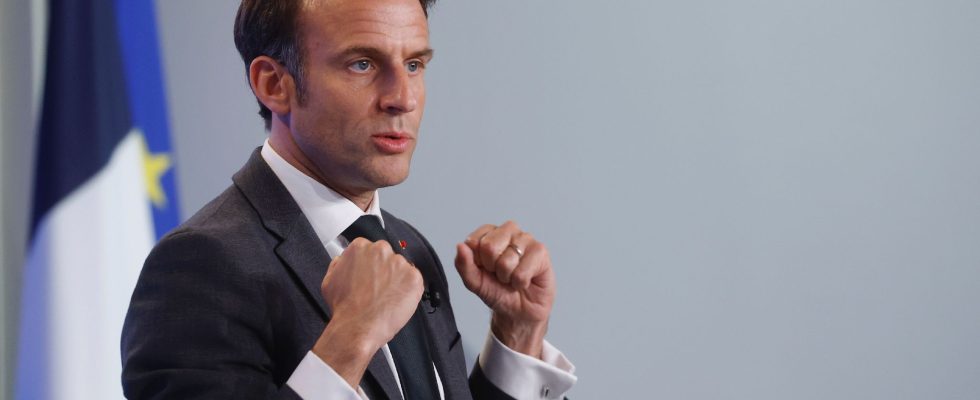One could almost believe that he got the year wrong. For lack of having campaigned exactly a year ago, in view of the presidential election, Emmanuel Macron is catching up. One day, a speech. And to think that some had claimed that he was now discreet on the national scene, even that he knew how to keep it short! Wednesday, May 10, publication on the site of Challenges of a river interview, as they say. Reading time: twenty-six minutes. Thursday 11, a speech of one hour and two minutes during a reception at the Elysée to “reindustrialize France”. Friday 12, two speeches on the occasion of a visit to the AstraZeneca factory in Dunkirk (North) and also, for those who prefer English, a forum at the FinancialTimes : “Europe needs more factories and fewer dependencies (Europe needs more factories and less dependency).” On Sunday 14, a very long interview at Opinion. Did you miss an episode? Monday 15, the president is the guest of what was for a long time the ne plus ultra of the media exposure, the 20 hours newspaper of TF1. At least we can’t blame him for being voiceless.
In this uninterrupted stream, some presidential remarks are just aimed at the obvious. He thus denounces “the denial of reality” of which we indeed observe the preponderant place it takes in the public debate. But the risk, when we talk a lot, is that we lend – a lot – to controversy. Thursday, May 11, the president calls for “a European regulatory break” regarding environmental standards. Since then, the red, pink and green left, with all the necessary bad faith and without ever going into nuance (which would inevitably turn against it the day it returns to power), falls on it with short arms, forcing Emmanuel Macron to clarify his remarks the next day, during his visit to Dunkirk. Observing a break is not going backwards, it is already respecting today’s constraints before considering adding others.
Another risk of the verbal avalanche is to want at all costs to give luster to one’s subject by presenting as new what is only repetition. In opinion, Emmanuel Macron indicates that he has “asked the Prime Minister and the competent ministers to resume copying [du projet de loi sur l’immigration] and to look with the political forces of the majority and the oppositions ready to cooperate”. He adds: “It is co-construction with these forces, which is a little different than working on amendments. […] The work that the Minister of the Interior and the Minister of Labor will do in the coming weeks is very important with the three majority groups, but also LR, the ecologists, the socialists. There will be a starting bet from the government, but we will look at how we can enrich it, complete it, modify it, perhaps give up bits, in order to build a majority.” This time, the string is too big, the President is not far from making fun of the (parliamentary) world: what he says is almost word for word what the Minister of the Interior, Gérald Darmanin, explained last fall about this same bill. He had decided to take his time, because he wanted to present to the Council of Ministers a text prepared with the deputies and senators. “When you get to Parliament, it’s already too late”, said- We then Place Beauvau. Emmanuel Macron is therefore only repeating the same refrain by presenting it as a novelty.
There is also a more political consequence to the current sequence: the omnipresence of Emmanuel Macron reduces the place taken by the other members of the executive. This president has never considered that a Prime Minister had a major role, the least that can be said is that he does not leave much space for Elisabeth Borne to mark the first anniversary of her arrival in Matignon: his interview in the Sunday newspaper, May 14, is preceded, accompanied and followed by statements by Emmanuel Macron…
The bet of the moment is audacious, but it is explained by the calendar: there remains, we sometimes forget, four years of quinquennium. He may concentrate all the arrows, Emmanuel Macron wants to be the only transmitter because he does not believe that the others will help him find some leeway. As Mitterrand said to those he wanted to flatter: “You are not the best, you are the only one.”
